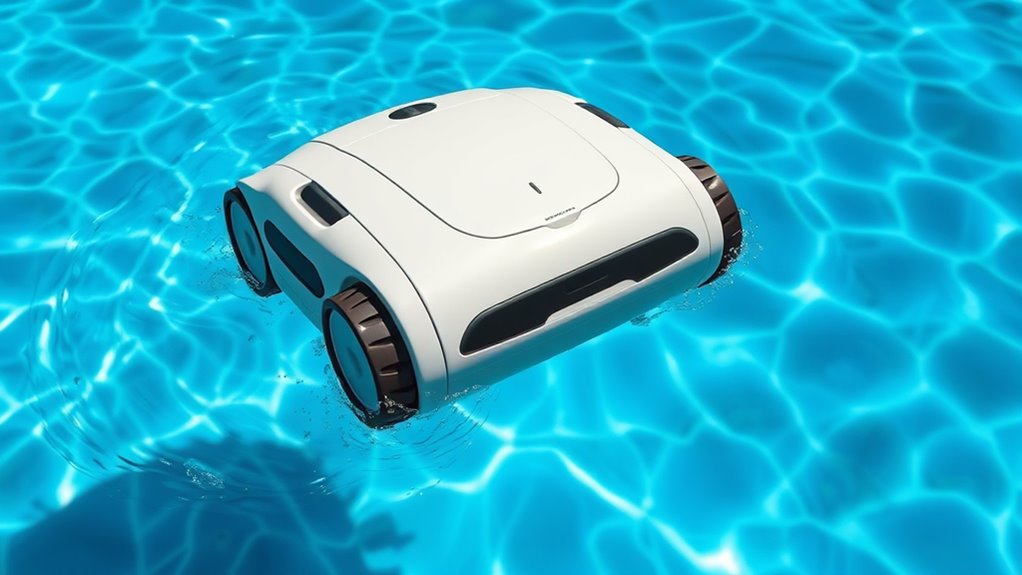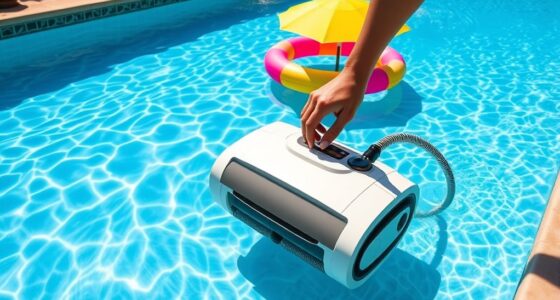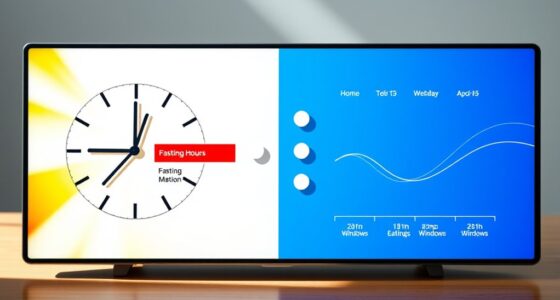Many believe automatic pool cleaners only work on small pools or can replace regular maintenance, but they’re designed for pools of all sizes and should complement manual tasks like skimming and chemical balancing. People often think all models are the same or require constant supervision, yet many are easy to maintain and cost-effective over time. They don’t damage surfaces or reduce water circulation, and understanding each type’s capabilities helps you choose the best fit for your pool. Keep exploring to learn more.
Key Takeaways
- Automatic pool cleaners are suitable for large pools, not just small ones, thanks to advanced navigation and cleaning speeds.
- They complement manual maintenance routines but do not replace tasks like skimming, chemical balancing, and brushing.
- Not all cleaners are identical; performance varies based on design, debris capacity, navigation, and pool surface compatibility.
- They save water and energy over time, reducing manual effort, chemical use, and operational costs.
- While effective at debris removal, they may struggle with stubborn or heavy debris and are less suitable for delicate or textured surfaces.
Automatic Cleaners Are Only for Small Pools
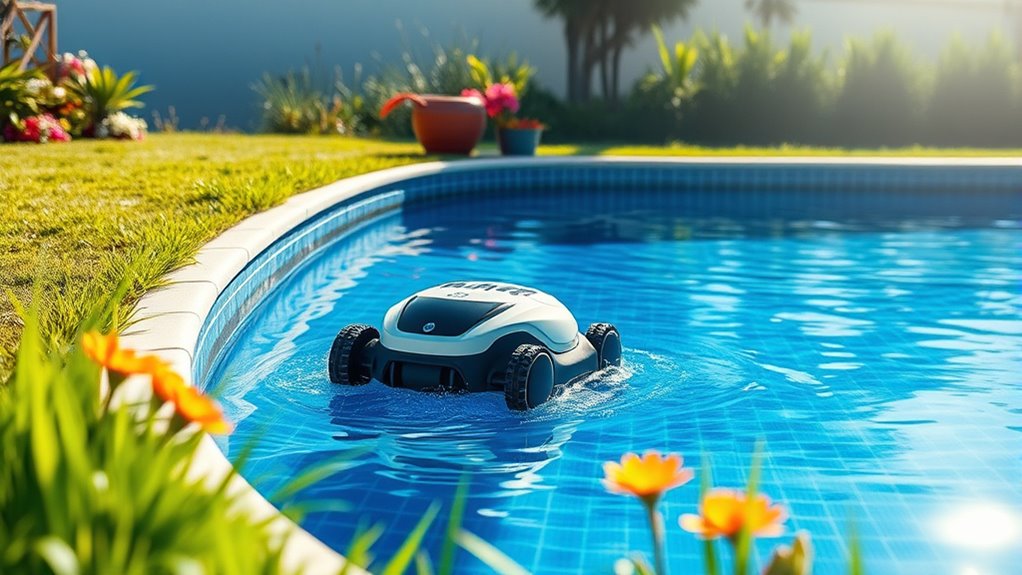
Many people believe automatic pool cleaners are only suitable for small pools, but that’s a misconception. Your pool size doesn’t limit the effectiveness of these devices. Modern automatic cleaners are designed to handle large pools efficiently, thanks to advanced cleaning speed and navigation systems. Larger pools may take more time to clean, but the speed at which an automatic cleaner works guarantees thorough coverage without you lifting a finger. You can choose models specifically built for bigger spaces, which optimize cleaning speed and maximize coverage. This ensures that coverage capabilities are not compromised regardless of pool size. Additionally, navigation and mapping technology allows these cleaners to efficiently cover large areas without missing spots. Incorporating scalable cleaning features further enhances their ability to adapt to various pool sizes, making them suitable for both small and large pools. Modern automatic cleaners also utilize advanced motor technology to maintain consistent performance over extended periods, further supporting their effectiveness in large pools. So, don’t assume they’re only for small pools—automatic cleaners can work just as well for large ones, saving you time and effort.
They Can Replace Regular Skimming and Maintenance
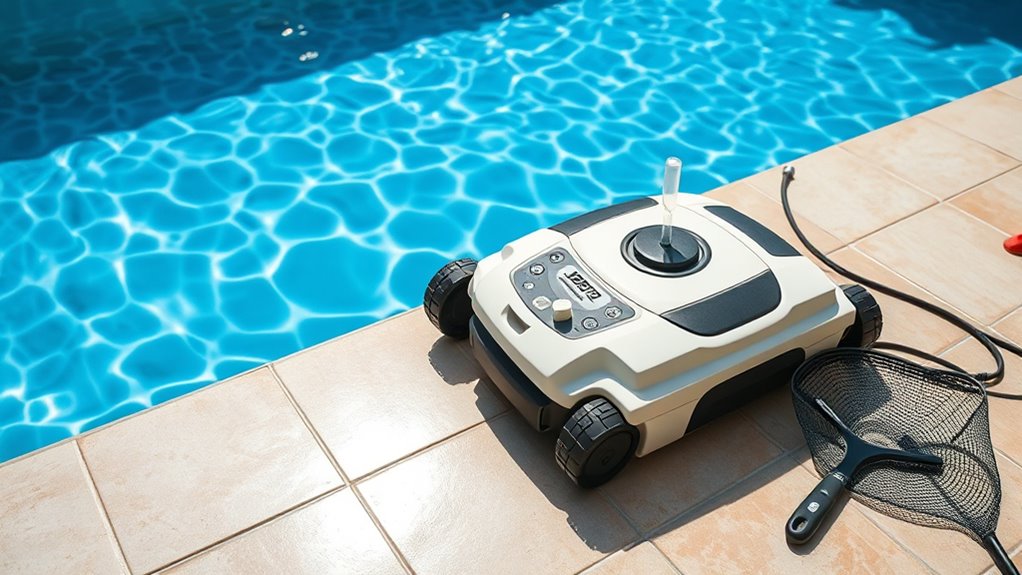
While automatic pool cleaners are excellent at keeping your pool tidy, they shouldn’t completely replace regular skimming and maintenance. Manual skimming removes surface debris that the cleaner might miss, like leaves or insects, preventing clogs and staining. Additionally, automatic cleaners don’t handle chemical balancing; proper chemical levels are essential for clear, safe water. Relying solely on a cleaner can lead to overlooked issues that affect water quality and equipment longevity. Regular maintenance tasks, such as brushing the pool walls and checking filters, ensure your system runs efficiently. It’s also important to periodically inspect and clean your pool’s filter system to maintain optimal performance. Proper water chemistry management is vital for optimal pool operation and longevity. Incorporating routine inspections helps identify potential issues early before they become costly repairs.
All Automatic Pool Cleaners Are the Same
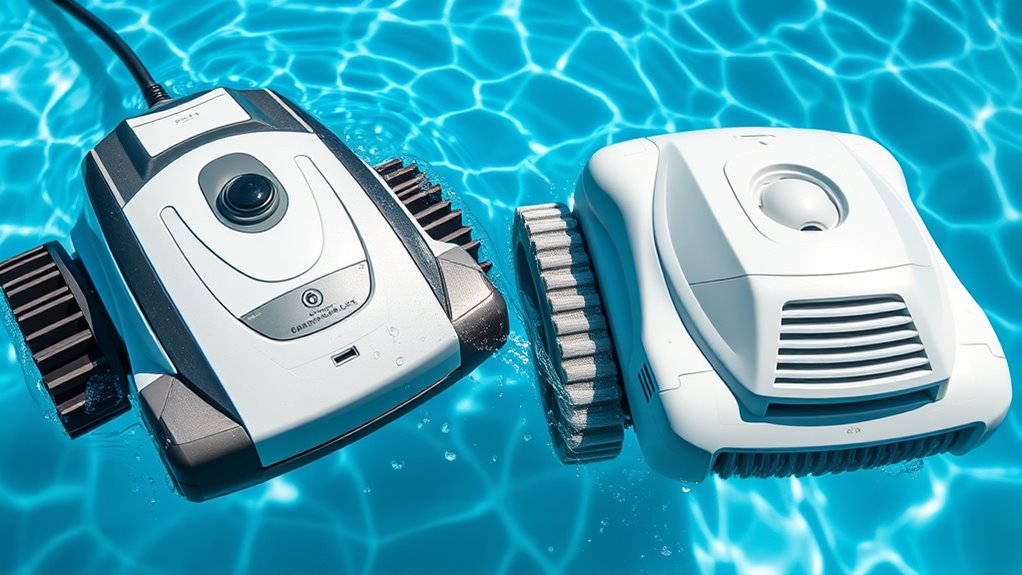
Not all automatic pool cleaners are created equal; they vary considerably in design, features, and performance. Some are better suited for small pools, while others handle larger areas with ease. You’ll also notice differences in cleaning speed, affecting how quickly your pool gets spotless.
Not all automatic pool cleaners are the same; they vary in design, features, and cleaning efficiency.
- Pool size limitations: Some cleaners are designed for specific pool sizes and won’t perform well outside those limits.
- Cleaning speed: Faster cleaners can cover your pool more efficiently, saving you time.
- Navigation technology: More advanced models navigate better, avoiding obstacles and covering every inch.
- Filtration capacity: Higher-capacity filters trap debris more effectively, reducing maintenance.
- Pool maintenance considerations, such as filter cleaning frequency and ease of access, can also influence your choice. Additionally, understanding the automatic pool cleaner types and their unique features helps in selecting the best fit.
- Moreover, innovations like smart navigation have improved the efficiency and coverage of modern automatic pool cleaners, making maintenance even easier for pool owners. A thorough understanding of cleaning effectiveness can help in choosing a model that meets your specific needs.
They Require Constant Supervision and Repairs
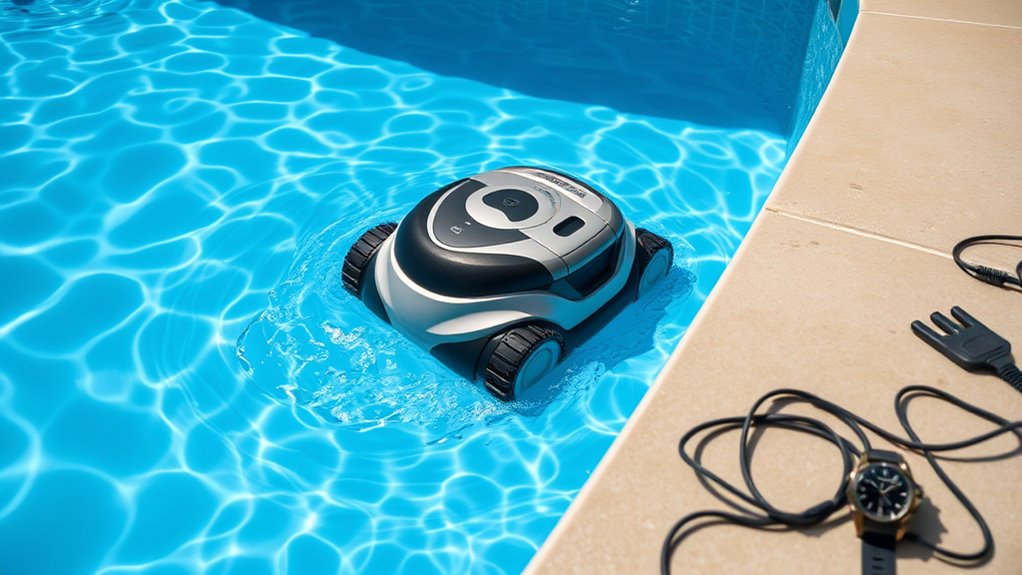
Contrary to some beliefs, automatic pool cleaners don’t require constant supervision or frequent repairs when properly maintained. Supervision myths often suggest you need to watch your cleaner constantly, but in reality, they’re designed to operate independently for most of the time. Regular maintenance, like cleaning filters and checking for obstructions, keeps them running smoothly. Repair misconceptions also abound—many problems are simple fixes or rare occurrences, not signs you must replace the entire unit. Modern automatic cleaners are built for durability and ease of use, so you won’t need to babysit them daily. Additionally, aquatic environments can sometimes influence the longevity of your cleaner, but proper care minimizes these effects. With proper care, your cleaner can handle routine tasks reliably, giving you more free time and less worry about ongoing supervision or frequent repairs.
Automatic Cleaners Are Too Expensive to Be Worthwhile
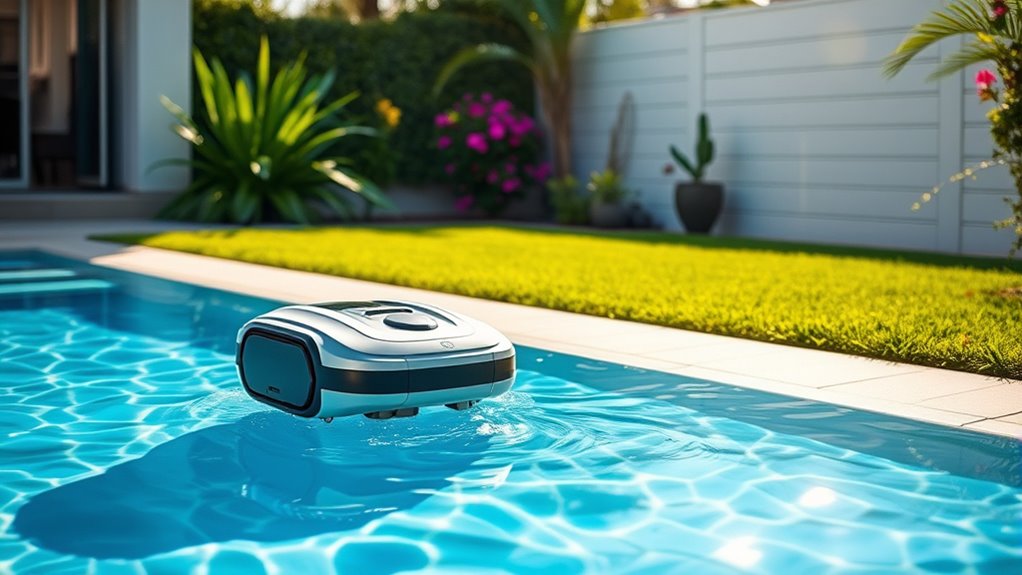
While automatic pool cleaners may seem costly upfront, they save you money over time by reducing maintenance and cleaning expenses. They also cut down on the time and effort required for manual cleaning, making them a worthwhile investment. In the long run, their efficiency can outweigh the initial price tag. Additionally, understanding Kia Tuning options can help vehicle owners optimize performance and get the most value from their modifications. Proper maintenance and choosing the right model can further enhance their cost-effectiveness, which is supported by data on grocery savings strategies and their impact on overall household budgets. Furthermore, as Automation in Business continues to expand, integrating such technologies can lead to increased savings and efficiency in various household and commercial settings. Moreover, recognizing the value retention of certain investments, such as gold in a Gold IRA, can further improve your financial planning and long-term savings.
Long-Term Cost Savings
Many people assume that automatic pool cleaners are too expensive upfront to justify their long-term value. However, they can lead to significant cost savings over time through improved energy efficiency and reduced chemical use. By keeping your pool cleaner and well-maintained, you minimize wear on equipment, lowering repair costs. Plus, automatic cleaners often use less energy than manual cleaning methods, reducing your environmental impact. Over years, these savings add up, making them a smart investment. Employing proper maintenance solutions can further enhance their efficiency and lifespan. Additionally, selecting models with energy-efficient features can maximize savings and performance.
Reduced Maintenance Expenses
Although automatic pool cleaners often come with a higher upfront cost, they can actually reduce your long-term maintenance expenses. These cleaners are designed to be energy-efficient, using less power than manual cleaning methods or traditional equipment. Because they operate regularly, they help keep your pool cleaner, reducing the need for costly chemical treatments and repairs caused by debris buildup. Additionally, their efficient cleaning process promotes water conservation by minimizing unnecessary backwashing or refilling. Over time, this can lead to significant savings on water and energy bills. While the initial investment might seem high, the reduced need for manual labor, fewer chemical expenses, and improved water management make automatic pool cleaners a cost-effective choice in the long run.
Time and Labor Efficiency
Automatic pool cleaners may seem expensive upfront, but they save you valuable time and effort in the long run. They’re designed for energy efficiency, reducing electricity use compared to manual cleaning methods. Plus, their scheduling flexibility allows you to set cleaning times that fit your routine, ensuring your pool stays pristine without extra effort. Over time, you’ll spend less on maintenance and chemical balancing because a cleaner pool requires fewer chemicals and less manual intervention. This efficiency means you can enjoy your pool more and worry less about upkeep. Investing in an automatic cleaner can be a smart choice when considering the long-term savings in time, energy, and labor.
- Reduced manual effort
- Customizable cleaning schedules
- Lower energy consumption
- Consistent, thorough cleaning
They Can Clean Every Surface and Debris Type
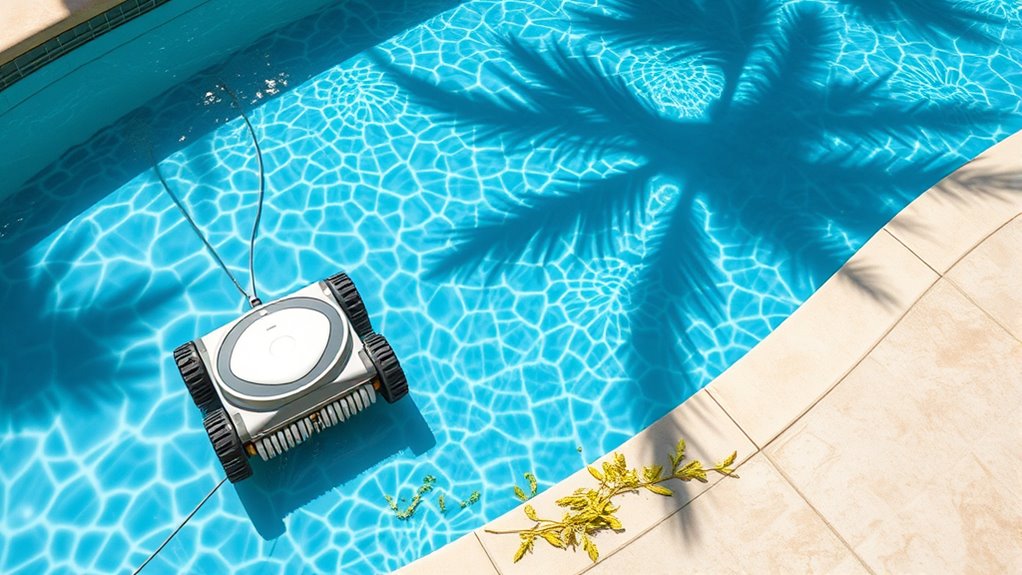
Automatic pool cleaners aren’t capable of cleaning every surface or debris type. Some models work better on certain pool surfaces and may struggle with larger or heavier debris. Knowing their limitations helps you choose the right cleaner for your pool’s specific needs.
Surface Compatibility Limits
Many believe that automatic pool cleaners can handle every surface and debris type, but that’s not entirely true. Surface fragility and material limitations restrict their effectiveness on certain surfaces. For example, delicate finishes may get scratched or damaged by brushes or suction. Some materials, like vinyl liners or soft tiles, can’t withstand aggressive cleaning actions. Additionally, textured or rough surfaces might cause the cleaner to get stuck or lose traction.
- Delicate surfaces like vinyl or soft tiles
- Highly textured or rough surfaces
- Surfaces prone to scratching or damage
- Materials that wear down brushes quickly
Understanding these limitations helps you prevent damage and choose the right cleaner for your pool’s surface. Always consider your pool’s specific surface and material fragility before selecting an automatic cleaner.
Debris Handling Capabilities
Are automatic pool cleaners truly capable of handling every type of debris and surface? Not quite. While they excel at leaf collection and dirt filtration, their effectiveness varies depending on debris size and surface texture. Most models can pick up leaves, twigs, and dirt, but heavy or stubborn debris might require manual intervention. Additionally, some cleaners struggle with fine dirt or algae, which can clog filters or reduce efficiency. Surface type also matters—rough or textured surfaces may hinder movement, limiting debris collection. To ensure thorough cleaning, choose a cleaner suited to your pool’s specific debris and surface conditions. Remember, automatic cleaners are a great aid but aren’t infallible in handling every debris type or surface surface without some oversight.
Using an Automatic Cleaner Means Less Water Circulation
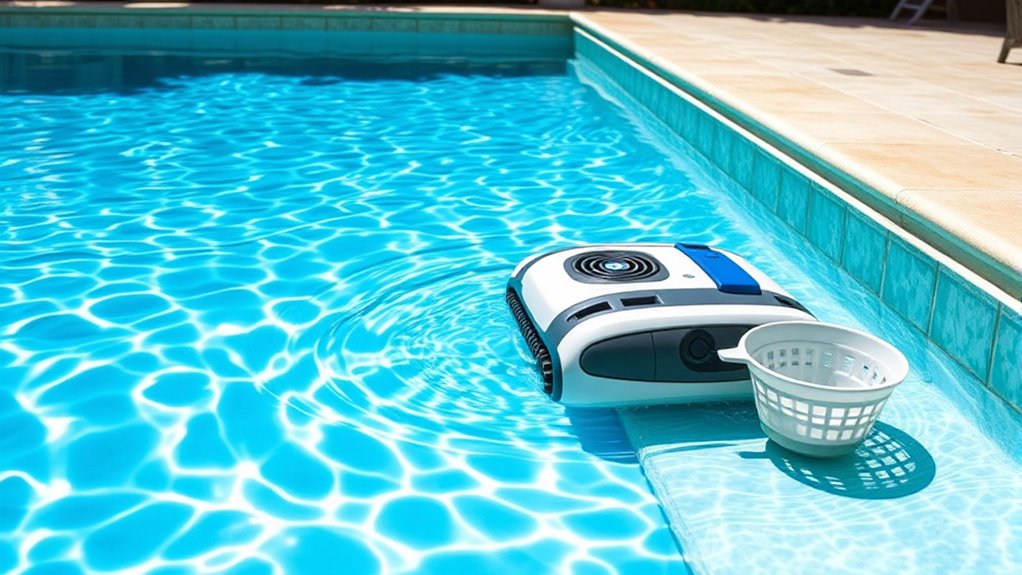
Some assume that using an automatic cleaner reduces water circulation in your pool, but this isn’t true. In fact, proper circulation is essential for maintaining balanced pool chemistry and preventing algae buildup. An automatic cleaner works alongside your circulation system, helping to distribute chemicals and filter debris efficiently. It doesn’t block water flow; instead, it complements your existing circulation, ensuring the water stays fresh and clear.
- Keeps debris moving, improving filtration efficiency
- Promotes even distribution of pool chemicals
- Prevents stagnant areas where algae can grow
- Supports overall water quality and clarity
Frequently Asked Questions
Can Automatic Pool Cleaners Handle Algae and Bacteria Effectively?
Automatic pool cleaners primarily excel at removing debris and dirt, but they don’t handle algae control and bacteria removal on their own. You need to maintain proper chemical levels, like chlorine, to keep algae and bacteria at bay. While some advanced cleaners might scrub surfaces well, regular chemical treatment is essential for effective algae control and bacteria removal, ensuring your pool stays safe and clean.
How Often Should I Run My Automatic Pool Cleaner?
You should run your automatic pool cleaner at least once a week to maintain ideal water quality. Adjust your cleaning schedule based on usage, weather, and debris levels. For instance, during heavy use or after storms, increase maintenance frequency. Regular cleaning helps prevent algae buildup and keeps your pool sparkling. Consistent use of your automatic cleaner ensures better overall pool maintenance and reduces the need for manual scrubbing.
Are Automatic Cleaners Suitable for All Pool Shapes and Designs?
You might think automatic cleaners are only for simple pools, but the truth is, they handle almost any pool shape or size with ease! Whether your pool is a tiny plunge or a sprawling lagoon, these cleaners adapt to complex curves and large areas effortlessly. They’re designed to work efficiently regardless of pool shape, making them a perfect solution for every pool size and design, saving you time and effort.
Do Automatic Pool Cleaners Work Well With Saltwater Pools?
You might wonder if automatic pool cleaners work well with saltwater pools. Generally, they are saltwater compatible, but you should check the manufacturer’s guidelines for cleaner efficiency. Saltwater pools can be gentler on the cleaner’s parts, potentially extending its lifespan. Confirm your cleaner is rated for saltwater to maximize performance. Proper maintenance and choosing a model designed for saltwater ensure your cleaner works effectively and lasts longer.
Can Automatic Pool Cleaners Operate in Pools With Complex Plumbing?
You might wonder if automatic pool cleaners can handle pools with complex plumbing. They generally work well, as long as the pool design doesn’t create significant obstacles or low flow issues. However, very intricate plumbing can sometimes hinder performance, causing the cleaner to miss spots or get stuck. To guarantee smooth operation, check your pool’s plumbing layout and choose a cleaner compatible with your pool’s specific design.
Conclusion
Don’t buy into the myth that automatic pool cleaners are only for small pools or that they require constant maintenance. The truth is, modern cleaners are affordable, efficient, and capable of handling many debris types and surfaces. They actually help improve water circulation and reduce your overall workload. So, instead of avoiding them, consider how they can make pool maintenance easier and more effective—your pool will thank you!
